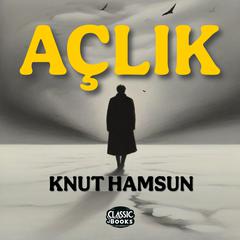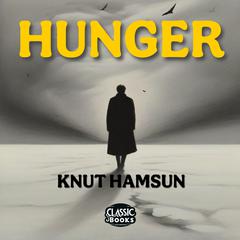 Play Audiobook Sample
Play Audiobook Sample
Hunger: A Novel Audiobook
 Play Audiobook Sample
Play Audiobook Sample
Quick Stats About this Audiobook
Total Audiobook Chapters:
Longest Chapter Length:
Shortest Chapter Length:
Average Chapter Length:
Audiobooks by this Author:
Publisher Description
Knut Hamsun's Hunger, first published in 1890 and hailed as the literary beginning of the twentieth century, is a masterpiece of psychologically driven fiction. The story of a struggling artist living on the edge of starvation, the novel portrays the unnamed first-person narrator's descent into paranoia, despair, and madness as hunger overtakes him. As the protagonist loses his grip on reality, Hamsun brilliantly portrays the disturbing and irrational recesses of the human mind through increasingly disjointed and urgent prose. Loosely based on the author's own experiences prior to becoming a successful writer, Hunger announced the arrival of a new kind of novel and heavily influenced such later writers as Kafka and Camus. This edition is the translation by George Egerton.
Download and start listening now!
"I'm pretty lucky, I guess; I've been middle-class all my life, never had to worry about where my next meal was coming from or if there would be a next meal. I've never known starvation, despite saying stuff like "I'm starving!" when it's a half-hour past lunchtime and I haven't eaten yet. So why do I identify with the undernourished protagonist of Hunger so strongly? Perhaps it's because I'm an introvert; like the protagonist, I sometimes have internal conversations with myself in the third person, or refer to myself (internally) as "we," or say "Let's go" to myself when there's no one else around. I also tend to superstitiously keep an antennae out for signs from the universe when making inconsequential decisions ("Hmm, Nature's Own bread or Pepperidge Farm? Hey, that kid just dropped a container of pepper. Pepperidge Farm it is!"). And sometimes I shake my fist (figuratively speaking) at God or the Universe or the Fates or whoever it is throwing me curveballs in life and probably having a good ol' time watching the results.Alright, so these are personality quirks, minor neuroses, subconscious whatevers that really don't do me any harm because my conscious mind is able to say "That's ridiculous" and move on. Hunger's protagonist, I think, for whatever reason, lacks that filter. He is so in tune with his own subconscious that he allows his subconscious to essentially do the driving. His rational, conscious mind watches himself from the outside as his subconscious makes him do things that he knows knows are ridiculous or harmful, but he can't help himself. He is his own audience surrogate; the observer and the observed. It is the lucid conscious mind that communicates with us, sidling up next to us, crossing its arms and shaking its head, good-naturedly lamenting, "Get a load of this guy, will you? What in the world is he thinking? What'll he do next?" We're both just here to watch the show, me and him, and the subconscious is the star.It is this convivial tone that keeps this book from being a descent into the dark murkiness of a tortured soul. Despite the Time Out quote on the cover of my edition that states, "One of the most disturbing novels in existence," it is not unremittingly bleak, as I was expecting. The tone is surprisingly lighthearted and humorous. The narrator certainly lives a grim existence, but he never feels sorry for himself, so neither do we. The fact that Hamsun never allows him to merely languish in self-pity is the source of it's great power. If this desperate, blighted man still has hope, then that certainly offers some hope to the rest of us."
— Rod (5 out of 5 stars)
Quotes
-
After reading Hunger, one can easily understand why Hamsun was awarded the Nobel Prize in Literature. Hunger should appeal to any reader who is interested in a masterpiece by one of this century's great novelists.
— James Goldwasser, Detroit News
Hunger Listener Reviews
-
" This is basically every writer's ultimate nightmare. It's an essentially plotless (and semi-autobiographical) tale of a writer who's come untethered; we follow his physical and psychological descent as he passes into the terrifying grip of hunger and despair, all while trying to hold on to his stubborn pride and delusions of authorial grandeur. Despite the book's brevity, it drags a bit, but there are some absolutely devastating scenes and passages. Hamsun's description of what it means to be hungry - truly hungry - is about as evocative as it gets. "
— Adam, 2/11/2014 -
" A story about a poor writer who can hardly write because he's so hungry. He's can't afford food because he hasn't sold any of his writing. And so the story stagnates. Hamsun brings in an interesting female character to spice up the story, but it's an obvious ploy. What I really liked, or the only thing I liked was the ending. It comes out of nowhere, interrupts the text, and put into other words, it's kind of figuratively funny. But I won't put it into other words because I wouldn't wan't to give away the ending. "
— Namrirru, 2/3/2014 -
" Probably one of the only books which ever gave me the feeling that I was slowly becoming the character. Can't quite remember if it was a stream of consciousness style, but it certainly made me feel ultra-aware, paranoid, and hungry. Translated from the Norwegian, 1890. Original title Sult. "
— May, 1/21/2014 -
" Possibly the best book I have ever read. No book truly embodies the life of the starving artist like this book does. I recommend it to any person who is trying to live their dream. "
— Philip, 1/21/2014 -
" Great read, makes you wonder what is real and what's not. "
— Larissa, 1/20/2014 -
" I read this in the Rebel Inc imprint and it is one of the leanest, meanest pieces of fiction ever. It is honest and visceral in a way that not many texts ever manage. If you haven't read it what are you waiting for? "
— Paul, 12/23/2013 -
" After twenty five years, more or less, this is still pretty much my all time favorite book. Hamsun was a huge influence on writers such as Hemingway, who said "Hamsun taught me how to write." Endless thanks are owed to my big brother for introducting me to this book. Kuboaa!! "
— Mary, 11/25/2013 -
" Probably my favorite book of all time. Poverty and misguided ambition lead a newspaper writer to starvation and depravity in Norway. He sucks on a stone while he walks to trick his stomach to think he is eating. Wonderful stuff. "
— Genevieve, 11/20/2013 -
" Depending on your taste consider carefully the reading of this book. You may be tempted to tear out a page and eat it in order to fight the hunger pangs Hamsun will stir in you. If you hate leftovers, buy a copy. If you are frugal, borrow it from the library. "
— T, 11/16/2013 -
" I confess I didn't get it. Maybe it was too European for me. I didn't hate it. "
— Kevin, 11/14/2013 -
" I read this in high school and it made a lasting impression on me. I need to read it again . . . "
— Maya, 7/28/2013 -
" For a classic, this book was boring. There were some entertaining parts but they are brief and forgettable. "
— George, 6/26/2013 -
" Reminds me a great deal of Notes from Underground. "
— Katherine, 3/21/2013 -
" Can someone with librarian status edit the book location? It is currently showing "Islamic Republic of Iran"?!? "
— Glenn, 2/10/2013 -
" Knut Hamsun, I give your novel two stars. There's the start of a gesture that others perform better. "
— evan, 8/10/2012 -
" Trans. by George Egerton with an Introduction by Monika Zagar. "
— Thom, 5/16/2012 -
" reminiscent of dostoyevsky, notes from underground. the naturalistic but strangely surreal street scenes, the half mad protaganist and his irrational actions. "
— Perrystroika, 3/28/2012 -
" Haunting and thought provoking. I couldn't put it down! "
— Alexandra, 9/16/2011 -
" The character of Hunger reminded me so much to another character in a novel by an Irish writer. I think it helped for me to sympathize with him that 1) I was writing some midterm essays 2) There was not much on the fridge. I have a weakness for arrogants and solitary ch. who over. think things. "
— Shadazz, 6/25/2011 -
" Read this one for my in depth study in Norwegian in my last year at junior high. It was a different, but nice experience. "
— Ingvild, 5/19/2011 -
" This is one of my all time favourite books and this edition has a great foreword by Duncan McLean. I read it working as a cycle messenger in Bristol during the winter, sitting on park benches in the cold waiting for jobs. A perfect combination. "
— Claire, 5/14/2011 -
" (In the words of Butch) "You feel that sting, big boy, huh? That's pride FUCKIN' with you. You gotta fight through that shit" "
— Paul, 5/10/2011 -
" Not the ideal for bedtime reading (which I prefer to be intensely plot-driven) but still fascinating. One of those good-to-know books. "
— Julie, 5/8/2011 -
" Trans. by George Egerton with an Introduction by Monika Zagar. "
— Thom, 4/28/2011 -
" This book is only awesome once you've finished it. <br/><br/>Had the "broke writer" trope been used in the year 1990 instead of 1890 I would have written it off. "
— Cole, 4/28/2011 -
" I thought this book was well written and it served it's purpose: to describe a mans agonizing stint with starvation. That's why it gets 4 stars. I didn't particularly enjoy the book, & I thought it's bleakness a little sad, but<br/>I guess that's the point. "
— Jen, 3/31/2011 -
" The character of Hunger reminded me so much to another character in a novel by an Irish writer. I think it helped for me to sympathize with him that 1) I was writing some midterm essays 2) There was not much on the fridge. I have a weakness for arrogants and solitary ch. who over. think things. "
— Shadazz, 3/11/2011 -
" Really fascinating! Hunger and being hungry comprise the setting of the story more than the actual physical location of Christiania (Oslo). Definitely worth a read. "
— Bonnie, 3/9/2011 -
" this didn't read like it was written in 1890 (although that could be the newer translation) and is certainly apt today. great descriptions of gnawing hunger and what starvation does to your mind. "
— Elisa, 2/12/2011
About Knut Hamsun
Knut Hamsun (1859–1952) was a Norwegian author whose best-known works include Hunger, Pan, Under the Autumn Star, and Growth of the Soil. His writing is characterized by deep investigation into the human mind and skepticism about the value of modern civilization, and his novel Hunger is often cited as the literary beginning of the twentieth century and a seminal work in the development of psychologically driven fiction. In 1920 Hamsun was awarded the Nobel Prize in Literature.
About Kevin Foley
Kevin Foley, an Earphones Award–winning narrator, has more than thirty years of experience in radio and television broadcasting, commercial voice-overs, and audiobook narration. He has recorded more than 150 audiobooks, including River Thunder by Gary McCarthy, for which he earned a Spur Award for Best Audiobook from the Western Writers of America.












